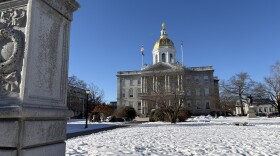A key regulatory panel is taking the first step to potentially reverse a controversial decision which allowed Eversource, the state’s largest energy provider, to raise its fees and change its ratemaking process.
In an order issued Monday, the Public Utilities Commission agreed to rehear the issue, after requests from the Office of the Consumer Advocate, the state chapter of AARP and the state Department of Energy in late August.
“It's a positive development,” said Don Kreis, the state’s consumer advocate. “It suggests that the commission is willing to rethink at least some of the determinations that it made.”
The commission has requested additional information from consumer advocate groups to better understand the impacts of the rate raises on New Hampshire residents.
The July commission decision allowed Eversource to raise the residential fixed customer charge, the flat fee everyone must pay monthly regardless of usage, each year until 2029. The July decision raised it from around $14 to nearly $20 and it will top out at about $43 at the end of the decade.
“I think that's a blatantly illegal thing,” Kreis said. He has previously said that it violates state law, which mandates rates must be “just and reasonable.”
“I'm guessing that the commission itself has realized that it went too far when it did that,” he added.
Christina FitzPatrick, who leads the local AARP chapter, said that price hike will particularly impact older people on fixed incomes.
“When you're talking about someone who might be living alone, which older people are more likely than younger people to live alone…it hits harder,” she said.
The commission also asked consumer advocates, Eversource and the Department of Energy for clarification about their concerns regarding its decision to allow Eversource to change how it calculates rate changes. The initial decision allowed Eversource to switch to a new ratemaking system until 2029, which would use predetermined formulas to calculate rate changes. Traditionally, utilities have to present a detailed case for each requested rate change. Consumer advocates Kreis and FitzPatrick say they’re concerned the change would decrease regulatory oversight and could potentially lead to higher rates.
Eversource spokesperson William Hinkle defended the rate changes from the original July order, which are still in place.
“We appreciate the opportunity to provide additional information in order to receive greater clarity on some of the more technically complex aspects of the commission’s original order,” he said in an email to NHPR.
Governor Ayotte criticized the decision, saying she was concerned about the impact of rate hikes on residents. Earlier this month, she announced she would not renominate PUC chairman Daniel Goldner whose term ended Sept. 15. Ayotte has not given a specific reason for that decision, but Kreis thinks the change may signal a cultural shift within the commission.
“And so I feel a sense of optimism and hope that the commission… might be a little more sensitive to ratepayer interests than the previous commission was,” he said.
Kreis said he expects a decision some time in November.








